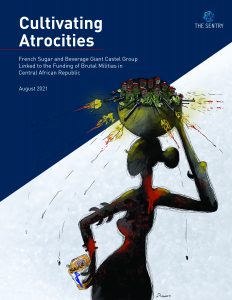 Read the full report
Read the full report
 Read the one-page summary
Read the one-page summary
> Lire le rapport en français
French giant Castel Group is the third-largest wine producer worldwide, the second-largest brewer in Africa, and a major bottling partner for Coca-Cola in Africa. A family-owned food and beverage empire with some 240 subsidiaries in 50 countries, Castel Group generates billions in revenue each year. Behind the scenes, however, a subsidiary of Castel Group has conducted business with violent armed groups responsible for mass atrocities in order to protect its market shares.
For almost 20 years, Castel Group has been operating Sucrerie Africaine de Centrafrique (African Sugar Refinery of the Central African Republic, or SUCAF RCA) in the war-torn Central African Republic (CAR)—a country that ranked 188 out of 189 in the 2020 Human Development Index.* According to The Sentry’s investigation, in late 2014, amid political and security upheaval, SUCAF RCA negotiated a security arrangement with an armed group, the Unité pour la paix en Centrafrique (Union for Peace in the Central African Republic, or UPC). Through this tacit agreement, UPC leaders committed to secure SUCAF RCA’s factory and sugar cane fields and to ensure free movement on key roadways necessary for the provision of supplies. SUCAF RCA also secured UPC support in trying to assure the company’s monopoly on sugar distribution in several prefectures, including through the forced seizure of smuggled sugar, particularly from Sudan. To protect its market, SUCAF RCA set up a sophisticated, informal system to finance the violent militias through direct and indirect cash payments, as well as through in-kind support in the form of vehicle maintenance and fuel provision. This tacit agreement between SUCAF RCA and UPC militias was active through March 2021, but its future remains uncertain due to the deployment of governmental and Russian forces in territories formerly controlled by the UPC.
“Culture de la violence”
Consulter le rapport en français.
Since their creation in late 2014, UPC militias, led by self-proclaimed General Ali Darassa, have committed mass killings, abductions, torture, child soldier recruitment, and sexual and gender-based violence. The United Nations (UN) has reported that the UPC militias committed mass atrocities that may constitute war crimes and crimes against humanity. In November 2018, the UPC was also responsible for a brutal attack on a camp of 18,000 displaced people in the town of Alindao that resulted in the massacre of over 112 civilians, most of them women and children. The Sentry’s findings show that both UPC leader Darassa and his number two at the time of the Alindao attack, Hassan Bouba, hold responsibility for the massacre. The Sentry’s investigation also indicates that the financial arrangement with SUCAF RCA has, in the meantime, primarily benefited the two men.
Members of The Sentry’s investigative team traveled multiple times to CAR, Cameroon, and France over the past two years, reviewed numerous documents and other evidence, and conducted dozens of interviews with individuals with first-hand knowledge of the dynamics described in the report, including witnesses of UPC exactions, members of armed groups, and people with direct knowledge of the arrangements between SUCAF RCA and armed groups, particularly the UPC. Reporting by The Sentry shows that Castel Group’s subsidiaries, SUCAF RCA and its Paris-based parent company Société d’Organisation de Management et de Développement des Industries Alimentaires et Agricoles (Food and Agricultural Industries Management and Development Company, or SOMDIAA), as well as SOMDIAA’s security contractor, retired French General Bruno Dary, have been regularly informed of the egregious human rights violations committed by the UPC. The investigation found that, despite this knowledge, SUCAF RCA management still provided financial and logistical support to criminal groups, primarily but not exclusively the UPC, for more than six years, thus helping to fuel armed conflict in CAR.
Key recommendations
Hold Castel Group’s subsidiaries and their managing directors accountable for potential complicity in war crimes and crimes against humanity.
- France’s national antiterrorism prosecutor’s office should launch an urgent investigation into the potential complicity and criminal liability of Castel Group’ subsidiaries—primarily but not exclusively the Paris-based SOMDIAA and the CAR-based SUCAF RCA—in war crimes and crimes against humanity, as well as under France’s Criminal Code. Based on the report’s findings, the French prosecutor’s office should also investigate the deliberate endangerment of the lives of SUCAF RCA’s employees, as well as any other economic and financial offenses for the seizure and smuggling of sugar.
- The prosecutor’s offices of the International Criminal Court (ICC) and the Central African Special Criminal Court (SCC) should undertake an urgent review of the evidence presented in this report and open an investigation into the alleged war crimes and crimes against humanity committed by the UPC and their enablers, in particular SOMDIAA and SUCAF RCA, in the context of renewed violence in CAR starting in December 2012. The ICC and the SCC should invite cooperation between international and national actors and address more directly the financial motives that fuel mass atrocities in the CAR conflict.
- The companies, holdings, and shareholders that constitute Pierre Castel’s business empire should immediately disclose to relevant authorities all materials in their possession connected to this report and undertake an open and transparent investigation into the alleged links between their businesses and armed conflict in CAR. The relevant companies and their respective boards of directors should also urgently initiate a full human rights and anticorruption due diligence audit of their Central African operations through an external third party.
- Central African law enforcement authorities should launch an urgent investigation as to potential criminal liability that arises from this report, specifically in reference to war crimes and crimes against humanity perpetrated by Ali Darassa and the current Central African Minister of Livestock Hassan Bouba, and collaborate with other judicial authorities regarding the potential complicity of Castel Group’s subsidiaries, SOMDIAA and SUCAF RCA, in war crimes and crimes against humanity.
- The UN, European Union, United States, and United Kingdom should investigate and, if appropriate, designate for sanctions the network of individuals and entities with links to Castel Group’s subsidiaries highlighted in this report who are allegedly fueling mass atrocities and profiting from state capture in CAR. Authorities should seek to track assets connected to the proceeds of this activity and, where identified, forfeit them and provide the resources for development purposes.
Read the full report and recommendations >

